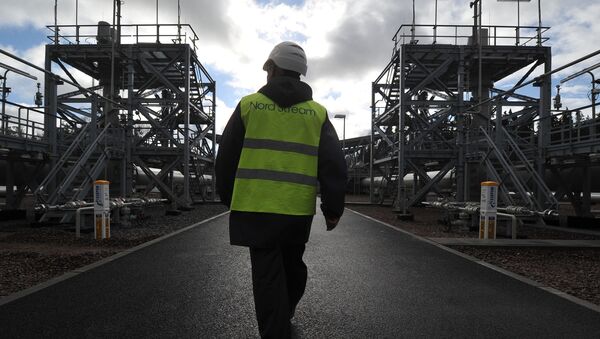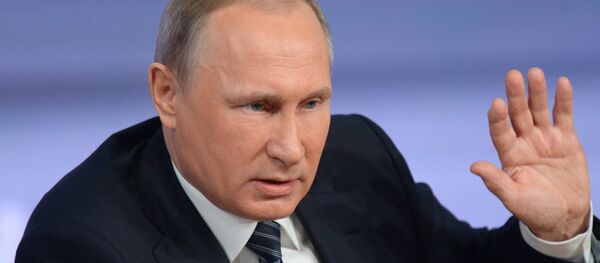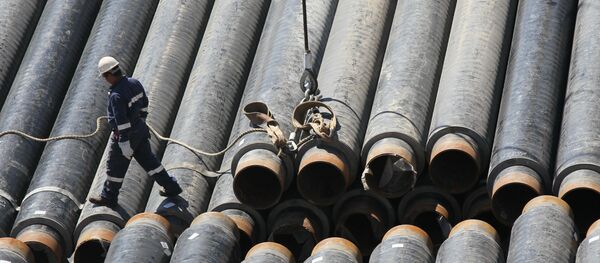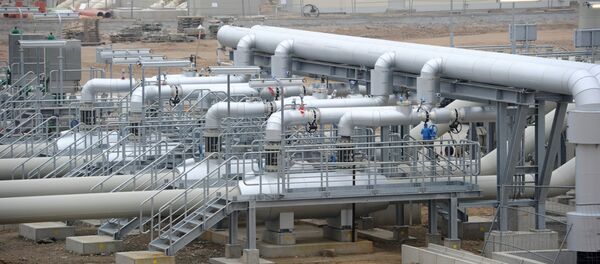MOSCOW (Sputnik), Ivan Kuzevanov — “Diversification” has become one of the key words 2015, characterizing the main economic policy goals of both customers and suppliers in the international gas market.
Political volatility in Ukraine pushed Russian energy giant Gazprom to intensify its search for alternatives to the unreliable transit route through its neighbor. The Russian company has been trying to pursue different gas pipeline projects to deliver gas to its customers in the European Union, however, a split inside the bloc and geopolitical tensions forced Moscow to seek out alternative customers in Asia.
Russia's 2019 Gas Transit Dilemma
Russia's concerns about the Ukrainian transit route deepened when Ukraine's national energy company Naftogaz appealed to an arbitration court in Stockholm in October 2014, seeking a retroactive revision of its natural gas transit contract with Russia, which was signed in 2009.
The lawsuit, demanding that the transit tariffs on gas be changed, made a potential extension of the contract between Gazprom and Naftogaz, expiring in 2019, even less realistic.
Later in April, Russian Energy Minister Alexander Novak said that Russia would most likely cease transiting gas through Ukraine once the current contract expires in 2019, citing Ukraine's unwillingness to compromise on the terms of the extension of the transit contract among the reasons behind the potential move.
According to Russian officials, the Ukrainian authorities insist that the price under a new agreement should increase to $5 per 1,000 cubic meters for every hundred kilometers transited, almost double the $2.70 Russia currently pays Ukraine.
"We won’t extend the transit contract with Ukraine on disadvantageous terms," Russian Prime Minister Dmitry Medvedev said in July, commenting on Kiev's negotiating stance.
The prime minister noted that gas deliveries to Europe via Ukraine would have to be halted unless the currenting contract is renewed in 2019, adding that new gas pipelines from Russia should be built since "there’s no sense in making forecasts about the future of the Ukrainian transit route."
Turkish Alternative
According to Moscow's plans, announced by Gazprom back in 2012, the alternative gas pipeline was expected to reach southern EU states directly via the Black Sea, bypassing Ukraine. The South Stream pipeline was expected to be fully operational by 2018.
On December 1, Russian President Vladimir Putin announced that Russia was unable to continue the gas pipeline project due to European Commission opposition. Brussels, concerned about the bloc's over-dependence on Russian energy, tried for a long time to hamper the potential pipeline construction, finding it to violate the European Union's Third Energy Package, which aims to unbundle energy suppliers from network operators.
Moscow’s surprise decision to drop the project came as a bolt from the blue for the European Union, with some southern European states accusing Brussels of drawing them into a power play with Moscow. According to a poll conducted by ICM Research exclusively for Sputnik, the majority of Serbs and Bulgarians said in January 2015 that Russia’s decision to scrap its South Stream gas pipeline project would hurt their countries' economy.
Also in December, Alexei Miller announced the construction of a new pipeline to Turkey – dubbed Turkish Stream – with an annual capacity of 63 billion cubic meters. Some 16 billion cubic meters of gas would be supplied to Turkey, while the rest was to be pumped to a hub on the Turkish-Greece border for customers in southern Europe.
In January, Gazprom said that Russia planned to sign an intergovernmental agreement with Turkey for the construction of the gas pipeline in the second quarter of 2015, with first deliveries scheduled for December 2016. According to Russian Energy Minister Novak, the Turkish Stream gas pipeline to deliver Russian gas to Turkey and southern Europe could possibly be extended to Austria through Greece, Macedonia, Serbia and Hungary.
On June 5, Turkish Minister of Energy and Natural Resources Taner Yildiz told Sputnik that Ankara was waiting for more detailed coordinates on the Turkish Stream gas pipeline from the Russian side to begin construction following receipt of the information. On June 15, he confirmed the requested coordinates had been received by Ankara.
Later that month, Moscow signed a memorandum on the construction of an extension of the Turkish Stream gas pipeline with Greece. According to Novak, Moscow would finance the project at first, and the funds spent "would be returned through the implementation of the project itself." The Greek leg of the project was expected to cost approximately 2 billion euros ($2.26 billion) with the construction set to begin in 2016 and last until late 2019.
At the same time, the Kremlin said that it was waiting for Ankara to signal the beginning of construction of the first section of the pipeline. In late July, a Russian Energy Ministry source told RIA Novosti that Russia had prepared and dispatched an intergovernmental agreement to Turkey for the first branch of the Turkish Stream gas pipeline several weeks beforehand.
The first signs of troubles were made public by the Russian officials when on July 29 Novak announced the possibility of a delay in the pipeline construction due to a holdup in signing the intergovernmental agreement between Russia and Turkey.
Turkish Ambassador to Russia Umit Yardim reacted to Novak's statement by stating that such “large-scale and global projects always have a complex preparation phase” and that Ankara and Moscow have not yet reached the stage of signing an intergovernmental agreement on the project, citing gas prices as one of the factor stalling the talks. Turkey had sought a 10.25-percent discount on the 28-to-30 billion cubic meters of natural gas Turkey buys annually from Russia.
Turkish Energy Minister Taner Yildiz admitted in August that Moscow and Ankara had differences over the Syrian conflict and the use the word "genocide" when describing the 1915 massacre of 800,000 to 1.5 million Armenians in the Ottoman Empire, a UN definition that Ankara refuses to recognize. However, the energy minister stressed that joint projects are "isolated from politics."
Later in the month, the Russian Energy Ministry said it was open to compromising with Turkey, noting that two versions of the intergovernmental agreement on the Turkish Stream had been sent to Ankara, proposing to construct either one or all four planned branches. Gazprom estimated the cost of constructing the first branch of the Turkish Stream pipeline at 4.3 billion euros ($4.72 billion), while the overall price tag for all four legs was estimated at 11.4 billion euros
One of the underlying factors that contributed to the Turkish stream failing to gain traction was the internal political struggle within Turkey. Turkey was due to hold a new round of elections on November 1, after the deadline for forming a new cabinet following elections in June passed.
The Russian side was prepared to wait, with Minister Alexander Novak stating in September that an intergovernmental deal on the Turkish Stream gas pipeline would be signed after a new government is formed in Turkey. Turkish interim Energy Minister Ali Riza Alaboyun confirmed to Sputnik that the interim Turkish authorities were convinced of the necessity of the project, however their status did not allow them to take any decisive steps.
In October, Novak said that Russia and Turkey would sign an intergovernmental agreement on the Turkish Stream gas pipeline no earlier than in December, after the Turkish government was formed.
However, the internal political process in Turkey delivered another blow to the project when, on November 24, a Russian Su-24 attack aircraft that was carrying out an anti-terrorist operation in Syria was shot down by a Turkish F-16 fighter. According to Ankara, the missile was shot in response to a violation of Turkish airspace. The Russian General Staff and the Syrian Air Defense Command said that the Su-24 never entered Turkish airspace.
On December 3, Novak said that intergovernmental negotiations between Russia and Turkey on the Turkish Stream gas pipeline have been suspended in line with economic restrictions against Turkey imposed by Russia due to security concerns following the air incident.
'German' Stream
The more problems Gazprom encountered with Turkey, the clearer it became to Moscow that an alternative could be found in the North and East rather than in the South. On the same day the initial deadline for signing the Turkish Stream deal, which was set by Gazprom when the project was announced, expired, the Russian energy giant announced it intention to construct a gas pipeline from Russia to Germany under the Baltic Sea with E.ON, Shell and OMV, expected to come on stream in 2019.
"The memorandum demonstrates the intention of the sides to implement the project of construction of two branches of the pipeline from the coast of Russia through the Baltic Sea to the coast of Germany. The capacity of the new pipeline will be 55 billion cubic meters annually," Gazprom said in a statement on June 18.
In July, Miller met German Minister for Economic Affairs and Energy Sigmar Gabriel. Both officials pointed out the success of the construction, the high operational efficiency and the environmental safety of the Nord Stream I gas pipeline and also highlighted the importance of creating new direct routes for Russian gas supplies to Europe amid declining domestic production in European countries.
In September, Gazprom and its partner companies signed a shareholders agreement on the Nord Stream-2 gas pipeline at the Eastern Economic Forum in Russia's Vladivostok. The signatories were Russia’s energy company Gazprom, with 51 percent of shares; E.On (10 percent); Shell (10 percent); OMV (10 percent); BASF/Wintershall (10 percent); and Engie (9 percent). Gazprom said it would confirm its business plan and pipeline tenders for the Nord Stream-2 project in January 2016.
Ukraine immediately sounded the alarm as, according to Ukrainian Prime Minister Arseniy Yatsenyuk, “for Ukraine the construction [of the Nord Stream-2] would mean excluding [it] from transit deliveries to the European Union, which is a loss of $2 billion in revenue that we receive for delivering gas to the EU.” However, in October, Russian President Putin called for the Nord Stream-2 project not to be politicized.
On October 29, Russian Energy Minister Novak said Russia was waiting for a decision by the European Commission and Germany concerning the construction of the Nord Stream-2 gas pipeline.
Earlier in December, the European Commission said its stance on the construction of the Russia-proposed Nord Stream-2 remains positive despite receiving a letter from several bloc member states, expressing their opposition to the project.
Chasing the Sun
Another means of diversification is to look for new markets rather than create alternative routes to traditional customers.
Russia made important progress in this direction in 2014, when Gazprom and the China National Petroleum Corporation (CNPC) signed a 30-year contract in May, stipulating the delivery of 38 billion cubic meters of Russian gas to China annually via the Power of Siberia pipeline, also known as the Eastern route. Construction of the pipeline was launched on September 1, while deliveries are scheduled to commence in 2018.
Hoping to build on the progress achieved in 2014, Russian Energy Minister Novak said in February 2015 that Moscow expected a contract to deliver Russian gas to China via the Western route to be ready for signing "in the coming months."
The Western route would connect gas fields in western Siberia with northwest China through Russia's Altai Republic, delivering 30 billion cubic meter of gas annually. Second and third sections may be added to the pipeline at a later date, bringing its annual capacity to 100 billion cubic meters.
In May, Gazprom CEO and vice-president of China's CNPC, Wang Dongjin, signed an agreement, defining the conditions for natural gas supplies from Russia to China via the Western route. Alexei Miller said the Russian energy giant was ready to start deliveries to China via the Western route as soon as the pipeline has been completed.
During the BRICS summit in the Russian city of UFA in July, Putin and his Chinese counterpart Xi Jinping agreed on financial assistance measures to support the implementation of major joint projects on the eastern and western gas delivery routes.
Although Gazprom noted certain progress had been made in its negotiations with CNPC on the construction of the Western route in August, the deal was not ready for signing during Putin's visit to Beijing on September 2-3.
Following the talks in China, Miller said that the signing of the deal on the Power of Siberia-2 pipeline was expected to take place in the spring of 2016.






